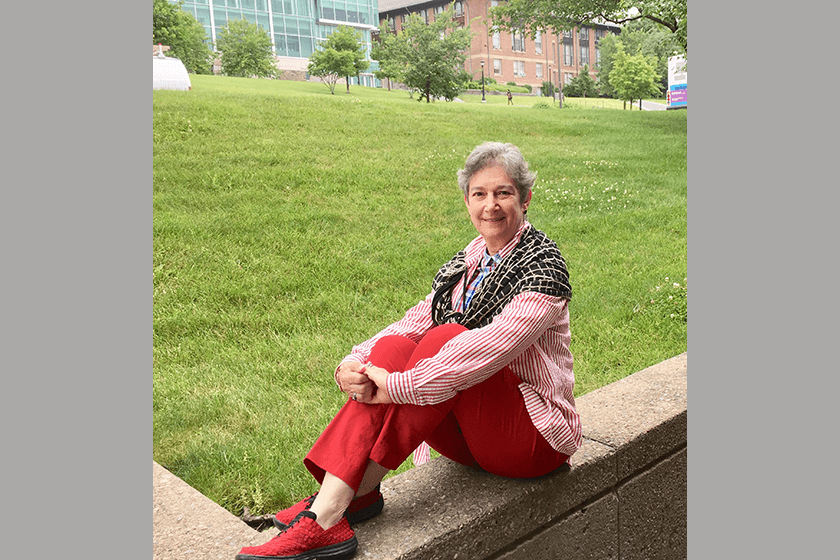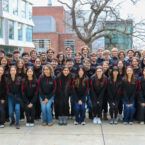Meet Andrea Ippolito, Founder of SimpliFed. Andrea graduated from Cornell with a master’s degree and bachelor’s degree in biological engineering. She later went on to earn her master’s degree in engineering and management from the Massachusetts Institute of Technology. She is the founder of SimpliFed, a telehealth platform democratizing access to baby feeding and breastfeeding services.
Where did the inspiration for your business come from?
SimpliFed is a virtual breastfeeding and baby feeding support practice. SimpliFed works with health plans to fully support breastfeeding and baby feeding support services during pregnancy and after a baby is born at no cost to families. After I had my first daughter, she was born early and underweight. I experienced how hard baby feeding was, and due to my background in healthcare systems, I learned that under the Affordable Care Act, breastfeeding services are supposed to be covered by commercial and Medicaid expansion plans, encompassing 38 states and D.C. I thought that there must be a better way to improve access to healthcare. We also found that 85% of families start off breastfeeding and then most switch to formula, which was similar to my experience as a new parent. To help better support families and democratize access to baby feeding support covered by health plans, we wanted to design a better, frictionless pathway that took both mental and physical health in mind as a parent. In addition, we wanted to improve access to care, which was supposed to be covered under the Affordable Care Act. Therefore, whether you are formula feeding, breastfeeding, or pumping, SimpliFed’s support is inclusive, accessible via our 100% virtual network, and fully covered by health plans at no cost to families.
Based on my background in health IT, telehealth, and as an entrepreneur in the past, this greatly helped inform the idea for starting SimpliFed. I graduated from Cornell with a bachelor’s degree in biological engineering and a master’s degree. Upon graduating, I worked in medical devices. After several years, I returned to graduate school at MIT, where my research focused on how to implement and scale tele behavioral health systems of care. At MIT, I co-founded my first company called Smart Scheduling. Smart Scheduling predicted no-shows to medical practices, and this business was eventually acquired by athenahealth. I then worked in the federal government, where I served as the director of an initiative at the Department of Veterans Affairs (VA) called the VA Innovators Network, which is the largest healthcare system in the country. Previously, I was a full-time faculty member in the College of Engineering at Cornell. All of these experiences together helped inform founding SimpliFed.
If you could go back in time, before you started your business, what would you tell yourself?
It is worth the challenge. Starting a company is not glamorous, especially when you are pregnant, postpartum, or have young kids. The experience is relentless. There are no days off. For my team, this is personal because we are redesigning a care pathway that we all have personally experienced as pregnant and new parents. We have a privilege to serve patients, and we want to get this experience right. We realize that there is a large opportunity to redesign what this care pathway looks like, and we take our work seriously. Because we are professionals and parents, sometimes we are hard on ourselves. However, it is important to enjoy the journey. It will be hard, but please make sure you take care of yourself. By taking care of yourself, you take care of your business.
What has been the greatest challenge that you have faced on your entrepreneurial journey?
There is no playbook. As you work within the healthcare system, there are always new challenges, but that is when you know that you are working to change and improve this experience for families. But that is what makes it fun.
It is not a matter of disrupting healthcare. It is about how we can improve the experience together. To disrupt means to do something outside of the system. People that try to impact the healthcare system by innovating outside of the healthcare system are often never successful. We try to work within the healthcare system to integrate and create an experience that is evidence-based and seamless. The key in healthcare is to improve the outcomes and the experience while reducing costs.
What are you most proud of about your journey and/or company?
I am super proud that we are democratizing access to these services. Under the Affordable Care Act, families are supposed to have access covered by the insurance or Medicaid expansion plan in 38 states and D.C. Coverage is supposed to extend from pregnancy through postpartum. We are working with health plans to educate them on the federal law and that by further supporting families, you can improve maternal health engagement as well. This can then help improve the health and well-being of both moms and babies, both their physical and mental health. Studies show that if a woman does not meet their breastfeeding expectations, they are more likely to be diagnosed with postpartum depression; so, it is critical to work with families prenatally to set expectations on what baby feeding looks like. I am also proud that we are raising awareness about it being a woman’s choice to feed their baby however they want. We are taking a fragmented and stigmatized system and being inclusive to each family’s needs.
Entrepreneurs wear many hats and must quickly become a master of all trades, so how do you find mentors and foster connections along the way?
A lot of people think that entrepreneurship is glamorous. An extremely small percentage of entrepreneurs become rich and famous. Not all entrepreneurs are venture-backed. Entrepreneurs come in many different forms. It is important that you find people who can help guide you. The folks that are the most helpful are those who are one step ahead of you who are near-peer mentors pursuing a similar path as you.
I am currently at the seed stage as defined by our funding, so I love getting support from Series A founders (the next stage of funding). Individuals who are one step ahead of me not only understand but can help guide me. For instance, one founder showed me a website that they used to share their pitch deck. There are a lot of tactics that if you are not exposed to them, it becomes more difficult to be on this journey alone. Therefore, it is important to support underrepresented entrepreneurs because networks are how you become acquainted with investors, customers, and team members.
Do you have any piece of advice for Cornellians starting out their own entrepreneurial journey?
If you are a first-time founder, accelerator programs are helpful. Accelerator programs are anywhere from 3-6 months. Some of these programs may give you funding, requiring you to give away equity or a percent in ownership. When starting a company, there are so many unknowns. These programs are helpful because they surround you with mentors and a framework to launch your business. If you are a second-time founder, the downside to these programs is that you may need to give away equity or a percent of ownership.
What role has the Cornell network played along your career?
Cornell has an incredible network. You are in great company. Sometimes I get nervous to reach out for help, but do not be afraid to do so. Sometimes you will not get a response. It is important to still ask for help. What is the worst that can happen? A big part of an entrepreneur is hustling and getting out there. Do not feel like you are being annoying. This took me a while to understand, but this mindset is important.
What do you miss about being on campus as a student?
My company is founded out of Ithaca, so I still get to see campus quite a bit! My Cornell experience while I was a student was so intellectually awesome. I am still incredibly close with my friends from Cornell, but I miss being around them every day.










